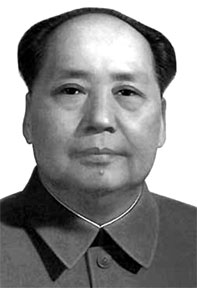Mao Zedong and his poems
by Mingxin Li
Chairman Mao (Mao Zedong or Mao Tse Tung) is known to be the founder
of the People's Republic of China in 1949 and recognised as one of the
prominent statesmen in the world. Moreover, he is a great poet in modern
Chinese literary history. His poems give a picturesque account of the
vicissitudes of Life, recording the unprecedented changes of China more
than 50 years in 20th century. His poems, some epic, some lyric, have a
touch of romanticism and realism. When all poems are collected in the
sequence of time, a rich historical painting would come out.
Chairman Mao once said, “poems express will”. His poems were indeed
soaked with his deepest feelings and aspirations. Mao Zedong is one of
the few who can write classical Chinese poetry in modern China, even
though he wrote fewer than 80 poems. His work is marked by war themes
with lofty revolutionary idealism which reveals an astonishing breadth
of learning and command of traditional Chinese classic style.
 |
|
Mao Tse Tung |
Mao Zedong has noble thoughts and splendid imagery which are given a
full play by the grand style in his poetry. It is because he made a
life-long study of classical literature, along with the rich experiences
of the revolutionary journey he took.
The following is one of Mao’s poems written in October 1935. After
conquering Mountain Liupanshang, the tallest mountain in the Red Army’s
Long March, the army eventually found their residence in Shanxi
Province. It put a full stop to the 25,000 mile journey. Mao Zedong
overlooking the world from the peak of the mountain chanted the poem.
The Long March
The Red Army fears no the Long March,
At ease in ten thousand crags and torrents.
The Five Ridges wind like gentle ripples,
And the majestic Wumeng roll like clay globules ;
Rolled and Warm the steep cliffs by the water of Jinsha,
Cold is the iron chains, the Dadu River when passing.
Snowy Min Mountain's thousand miles crossed in rejoice,
The three Armies march on, each face glowing joyously
In this lushi (a kind of classic style), the reader can follow the
Red Army’s footprint to feel what the Long March is. That the Red Army’s
optimistic revolutionary spirit goes sharply against the perilous
situation appears to be the world with less than 60 words. Moreover, the
connotation is far beyond time and space, with its unique heavy but rare
splendid deeds in the world history.
Long March
What does Long March mean?
Under Chinese writers’ pen, Long March is the “global read ribbon”.
In American writer Harrison Salisbury’s book, Long March is “the
unprecedented story”.
And Edgar Snow praises Long March as a soul-thrilling epic.
MaoZedong’s poetry is noted for its sublimity of thought and majesty
of expression. Chairman Mao said: “Fighting with heaven, fighting with
earth, and fighting with human being, what a great pleasure!” the
optimistic spirit can be found in another poem “To the Tune of Chin Yuan
Chun”
To The Tune of Chin Yuan Chun
February 1936
North Country scene:
Locked in ice in hundreds of miles,
The whirling snow in thousands of miles.
Both sides of the Great Wall
A view of white immensity .
The Yellow River's swift current
Is stilled from end to end.
The mountains dance like silver snakes
And the plain like wax-hued elephants,
Competing with heaven in stature.
Such a fine day?
Clad in white, adorned in red,
Is more enchanting, my land.
This land so rich in beauty and grand,
Has made countless heroes bow with hand.
Alas! Chin Shih-huang and
Han Wu-ti
Were lacking in literary grace,
And Tang Tai-tsung and Sung Tai-tsu
If were in poetic souls;
And Genghis Khan,
Son of Heaven for a time being,
Knew only artery bow, shooting eagles
The past all gone!
For truly great men
Look to this age alone.
In this poem, Mao Zedong expresses his cordial love to his great
native land. The communist party will lead Chinese people to the total
revolutionary so as to defend the motherland, to create a new world by
the people and for the people. So the people are great men in this age,
all the emperors in the past dynasties have gone. Only people with their
wisdom and strength can keep the land an everlasting beauty.
Chairman Mao is not only a revolutionist, a prominent leader, but
also a great man with deep love and affection to his family. The poem
“reply to Li Shuyi” describes his long missing and passionate love to
his first wife—a loyal communist revolutionist Yang Kaihui who was
killed by the reactionaries and his second wife He Zizhen, who separated
from each other in the war.
Reply To Li Shuyi ----
To the tune of Die Lian Hua
May 11, 1957
I lost my proud Poplar and you your Willow,
Poplar and Willow soar to the Ninth Heaven.
Ask Wu Kang in the moon,
What can he give,
Serves them laurel brew.
The lonely moon goddess Chang’er,
Dancing with her ample sleeves,
Dancing for these loyal souls in infinite space.
At the tiger subdued from earth,
They pour tears of joy from heaven as mighty rain.
There are more poems that can be read by rich imagery grace and
spirit in Mao’s selected reading. Many years after his death, in China
when many remember Mao, the ineffaceable figure is always kept in many
people’s minds to remind them of the unforgettable war days and the
majestic time when they witnessed a new China birth. When we read his
poems and his books, it's as though the great figure is beside us to
tell us his unusual story related to history, today and tomorrow.
The writer is a lecturer at Henan Polytechnic University, China.
|


